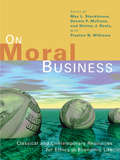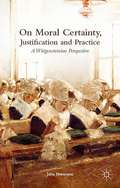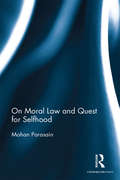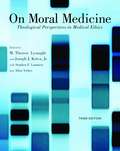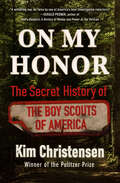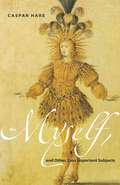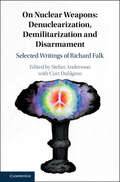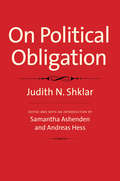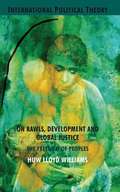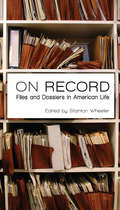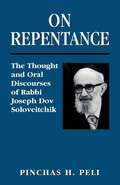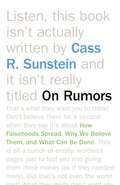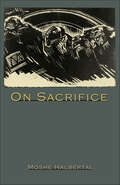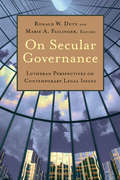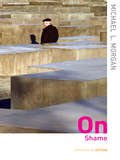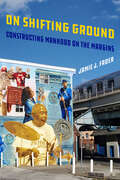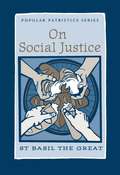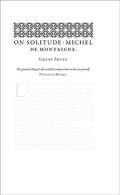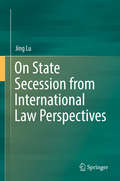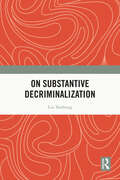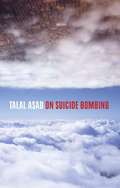- Table View
- List View
On Moral Business: Classical and Contemporary Resources for Ethics in Economic Life
by Shirley J. Roels Max L. Stackhouse Dennis P. McCann Preston N. WilliamsThis broad-ranging reader collects key biblical, classical, cross-cultural, and contemporary texts on how faith, especially Christianity, has shaped economic life in the past and how it can continue to do so in our emerging global civilization. The readings assembled here -- drawn from historical, theological, and social-theory resources -- provide a massive array of materials unprecedented in a single volume. Drawing from sources as diverse as the Bible, the great philosophers, and today's ethically committed business leaders, On Moral Business is ideal for helping tomorrow's leaders understand better how to put our economic life on a sure moral foundation.
On Moral Certainty, Justification and Practice
by Julia HermannOn Moral Certainty, Justification and Practice presents a view of morality that is inspired by the later Wittgenstein. Hermann explores the ethical implications of Wittgenstein's remarks on doubt, justification, rule-following, certainty and training, offering an alternative to interpretations of Wittgenstein's work that view it as being intrinsically ethical. The book scrutinises cases in which doubt and justification do not make sense, and contrasts certain justificatory demands made by philosophers with the role of moral justification in concrete situations. It offers an account of moral certainty, which is linked to a view of moral competence. Contrary to the views propounded by philosophers who emphasise the importance of moral principles, it is argued that moral agency is first and foremost a matter of having certain capacities. The book takes an anti-intellectualist stance and remains close to concrete practices. The practice-based view of morality it endorses has implications for moral education, intercultural moral dialogue and the prospects for moral agreement, change and progress.
On Moral Law and Quest for Selfhood
by Mohan ParasainThis book offers an original intersection of concepts from Immanuel Kant’s moral command ethics and Søren Kierkegaard’s existential ethics. The Kantian formulation of moral law is based on theoretical ground while Kierkegaardian ethics of the quest for selfhood views it as the very act of living. The present work provides an account of both these perspectives and questions whether these approaches to morality are mutually exclusionary. Using Slavoj Žižek’s ‘parallax view’ in the realm of morality, it argues that moral philosophy must engage with a constant critique of ‘difference’ around which the transformation of our various perspectives to morality revolves. This work appeals for furtherance of the conversation model and participation of perspectives to transcend ‘positional confinement’. It advocates the traversing of the ethical parallax to allow for intellectual openness and an empathetic perception of the ‘other’. Engaging and well-researched, this book will be of interest to scholars and researchers of ethics, political philosophy and continental philosophy.
On Moral Medicine: Theological Perspectives on Medical Ethics
by Allen Verhey M. Therese Lysaught Joseph Kotva Stephen E. LammersIn print for more than two decades, On Moral Medicine remains the definitive anthology for Christian theological reflection on medical ethics. This third edition updates and expands the earlier awardwinning volumes, providing classrooms and individuals alike with one of the finest available resources for ethics-engaged modern medicine.
On My Honor: The Secret History of the Boy Scouts of America
by Kim ChristensenFrom a Pulitzer Prize winning journalist, the shocking rise and fall of an American institution. Since its founding in 1910, the Boy Scouts of America has been the nation&’s premier youth organization, espousing self-reliance and honor. More than 100 million Americans have been Boy Scouts, from Bill Gates to Martin Luther King Jr. Today, however, Scouting faces an existential threat of its own making: more than 82,000 former Scouts have filed claims alleging they were sexually abused—seven times the number of similar allegations that rocked the Catholic Church two decades ago. On My Honor untangles the full story of the Boy Scouts of America, tracking its creation, growth, influence, and the massive generational trauma it has caused. Using the iconic institution to tell a story of American values over the last century, the book grapples with America&’s changing understanding of what it means to &“make men.&” This riveting story of power and abuse, religion and politics, scandal and justice, is brought to life by groundbreaking research and an unforgettable cast of characters.
On Myself, and Other, Less Important Subjects
by Caspar HareCaspar Hare makes an original and compelling case for "egocentric presentism," a view about the nature of first-person experience, about what happens when we see things from our own particular point of view. A natural thought about our first-person experience is that "all and only the things of which I am aware are present to me." Hare, however, goes one step further and claims, counterintuitively, that the thought should instead be that "all and only the things of which I am aware are present." There is, in other words, something unique about me and the things of which I am aware. On Myself and Other, Less Important Subjects represents a new take on an old view, known as solipsism, which maintains that people's experiences give them grounds for believing that they have a special, distinguished place in the world--for example, believing that only they exist or that other people do not have conscious minds like their own. Few contemporary thinkers have taken solipsism seriously. But Hare maintains that the version of solipsism he argues for is in indeed defensible, and that it is uniquely capable of resolving some seemingly intractable philosophical problems--both in metaphysics and ethics--concerning personal identity over time, as well as the tension between self-interest and the greater good. This formidable and tightly argued defense of a seemingly absurd view is certain to provoke debate.
On Nuclear Weapons: Selected Writings of Richard Falk
by Stefan Andersson Curt DahlgrenWe are at a time when international law and the law of war are particularly important. The testing of nuclear weapons that is being used in the rhetoric surrounding threats of war is creating new fears and heightening current tensions. Richard Falk has for decades been an outspoken authority calling for nuclear disarmament and the enforcement of non-proliferation treaties. In this collection of essays, Falk examines the global threats to all humanity posed by nuclear weapons. He is not satisfied with accepting arms control measures as a managerial stopgap to these threats and seeks no less than to move the world back from the nuclear precipice and towards denuclearization. Falk's essays reflect the wisdom and innovative thinking he has brought to his long career as a scholar and activist, as he reminds nuclear weapons states of their obligation under international law and moral imperative to seek nuclear disarmament.
On Political Obligation
by Judith N. ShklarA compelling set of lectures on political obligation that contributes to ongoing debates in political theory and intellectual history This stimulating collection of lectures by the late Judith Shklar on political obligation is paired with a scholarly introduction that offers an overview of her life, illuminates the connections among her teaching, research, and publications, and explains why her lectures still resonate with us and contribute to current debates in political theory and intellectual history.
On Quality: An Inquiry into Excellence: Unpublished and Selected Writings
by Robert M Pirsig Wendy K. PirsigFeaturing long-awaited selections from Robert M. Pirsig's unpublished writings, from before and after Zen and the Art of Motorcycle Maintenance, an original collection illuminating the central theme of Pirsig's thought: “Quality”“The ultimate goal in the pursuit of excellence is enlightenment." —Robert M. Pirsig, 1962More than a decade before the release of the book that would make him famous, Robert M. Pirsig had already caught hold of the central theme that would animate Zen and the Art of Motorcycle Maintenance: “Quality,” a concept loosely likened to “excellence,” “rightness,” or “fitness” that Pirsig saw as kindred to the Buddhist ideas of “dharma” or the “Tao.” As he later wrote in Zen, “Quality is the Buddha.”Though he was revered by fans who considered him a guru, the famously private Pirsig published only two books and consented to few interviews and almost no public appearances in later decades. Yet he wrote and thought almost continually, refining his “Metaphysics of Quality” until his death in 2017.Now, for the first time, readers will be granted access to five decades of Pirsig’s personal writings in this posthumous collection that illuminates the evolution of his thinking to an unprecedented degree. Skillfully edited and introduced by Wendy K. Pirsig, Robert’s wife of four decades, the collection includes previously unpublished texts, speeches, letters, interviews, and private notes, as well as key excerpts from Zen and the Art of the Motorcycle Maintenance and his second book, Lila.Since its publication in 1974, Zen and the Art of Motorcycle Maintenance has established itself as a modern classic of popular philosophy; selling millions of copies and inspiring a generation, while serving as a perennial touchstone for the generations that follow. On Quality is a remarkable contribution to our understanding of one of the most influential thinkers and writers of our time.
On Rawls, Development and Global Justice
by Huw Lloyd WilliamsJohn Rawls' text The Law of Peoples has inspired extensive scholarly debate in the field of international political theory, since its publication in 1999. Responding to the arguments of cosmopolitan theorists and Amartya Sen's recent critique, this new work presents a fresh appraisal of the debate, and argues that Rawls offers a persuasive and prescient moral perspective on issues of global poverty and development. By elaborating one of Rawls' core ideas, 'the duty of assistance', the book offers a unique theoretical response to the ideal of global justice. The duty is presented as a far-reaching principle of justice, one that advocates increasing the state capability of burdened societies, and aims to compel the most powerful states to reform international structures and provide aid, in a constructive and culturally sensitive manner. The aim of assistance is the strengthening of democratic, or 'decent' indigenous institutions and the promotion of the freedom of peoples. On Rawls, Development and Global Justice is an original contribution to current debates on international redistribution, democracy promotion and global poverty.
On Record: Files and Dossiers in American Life
by Stanton WheelerOn Record provides descriptive accounts of record-keeping in a variety of important organizations: schools and universities; consumer credit agencies, general business organizations, and life insurance companies; military and security agencies; the Census Bureau and the Social Security Administration; public welfare agencies, juvenile courts, and mental hospitals. It also examines the legal status of records. The authors address questions such as: Who determines what records are kept? Who has access to the records? To what extent do the records follow an individual? What are some of the dangers and pitfalls in record-keeping? Throughout the volume, the authors show a concern for an appropriate balance between the need for information about people and protection against undue invasions of privacy. The introduction of electronic databases since the original publication of this book makes the issues raised in this seminal collection even more timely.
On Repentance: The Thought and Oral Discourses of Rabbi Joseph Dov Soloveitchik
by Pinchas H. PeliFor five decades prior to his death in 1993, Rabbi Joseph Dov Soloveitchik was the unchallenged leader of modern Orthodox Judaism in the United States. His understanding of both traditional Judaism and secular philosophy shaped two generations of rabbinic students at Yeshiva University, and charted a new course for American Orthodox Jews. In On Repentance, noted scholar Pinchas Peli has gathered the major points of Rabbi Soloveitchik's teachings on teshuvah (repentance), based on the annual series of lectures on the theme of teshuvah, presented on the anniversary of his father's death. For many Jews, these lectures were the major academic and intellectual event of the year. Outside of his followers however, few were able to experience the genius of Rabbi Soloveitchik. He gave his lectures in Yiddish, and generally refused to publish. Now readers can experience the brilliant thinking of this great teacher and sage.
On Rumors: How Falsehoods Spread, Why We Believe Them, and What Can Be Done
by Cass R. SunsteinMany of us are being misled. Claiming to know dark secrets about public officials, hidden causes of the current economic situation, and nefarious plans and plots, those who spread rumors know precisely what they are doing. And in the era of social media and the Internet, they know a lot about how to manipulate the mechanics of false rumors—social cascades, group polarization, and biased assimilation. They also know that the presumed correctives—publishing balanced information, issuing corrections, and trusting the marketplace of ideas—do not always work. All of us are vulnerable.In On Rumors, Cass Sunstein uses examples from the real world and from behavioral studies to explain why certain rumors spread like wildfire, what their consequences are, and what we can do to avoid being misled. In a new afterword, he revisits his arguments in light of his time working in the Obama administration.
On Sacrifice
by Moshe HalbertalThe idea and practice of sacrifice play a profound role in religion, ethics, and politics. In this brief book, philosopher Moshe Halbertal explores the meaning and implications of sacrifice, developing a theory of sacrifice as an offering and examining the relationship between sacrifice, ritual, violence, and love. On Sacrifice also looks at the place of self-sacrifice within ethical life and at the complex role of sacrifice as both a noble and destructive political ideal. In the religious domain, Halbertal argues, sacrifice is an offering, a gift given in the context of a hierarchical relationship. As such it is vulnerable to rejection, a trauma at the root of both ritual and violence. An offering is also an ambiguous gesture torn between a genuine expression of gratitude and love and an instrument of exchange, a tension that haunts the practice of sacrifice. In the moral and political domains, sacrifice is tied to the idea of self-transcendence, in which an individual sacrifices his or her self-interest for the sake of higher values and commitments. While self-sacrifice has great potential moral value, it can also be used to justify the most brutal acts. Halbertal attempts to unravel the relationship between self-sacrifice and violence, arguing that misguided self-sacrifice is far more problematic than exaggerated self-love. In his exploration of the positive and negative dimensions of self-sacrifice, Halbertal also addresses the role of past sacrifice in obligating future generations and in creating a bond for political associations, and considers the function of the modern state as a sacrificial community.
On Secular Governance: Lutheran Perspectives on Contemporary Legal Issues
by Ronald W. Duty Marie A. FailingerThis volume puts forth an unprecedented, distinctive Lutheran take on the intersection of law and religion in our society today. On Secular Governance gathers the collaborative reflections of legal and theological scholars on a range of subjects — women&’s issues, property law and the environment, immigration reform, human trafficking, church-state questions, and more — all addressed from uniquely Lutheran points of view.
On Secular Governance: Lutheran Perspectives on Contemporary Legal Issues
by Ronald W. Duty Marie A. FailingerThis volume puts forth an unprecedented, distinctive Lutheran take on the intersection of law and religion in our society today. On Secular Governance gathers the collaborative reflections of legal and theological scholars on a range of subjects — women’s issues, property law and the environment, immigration reform, human trafficking, church-state questions, and more — all addressed from uniquely Lutheran points of view.
On Settling
by Robert E. GoodinThe hidden value of settlingIn a culture that worships ceaseless striving, "settling" seems like giving up. But is it? On Settling defends the positive value of settling, explaining why this disdained practice is not only more realistic but more useful than an excessive ideal of striving. In fact, the book makes the case that we'd all be lost without settling—and that even to strive, one must first settle.We may admire strivers and love the ideal of striving, but who of us could get through a day without settling? Real people, confronted with a complex problem, simply make do, settling for some resolution that, while almost certainly not the best that one could find by devoting limitless time and attention to the problem, is nonetheless good enough. Robert Goodin explores the dynamics of this process. These involve taking as fixed, for now, things that we reserve the right to reopen later (nothing is fixed for good, although events might always overtake us). We settle on some things in order to concentrate better on others. At the same time we realize we may need to come back later and reconsider those decisions. From settling on and settling for, to settling down and settling in, On Settling explains why settling is useful for planning, creating trust, and strengthening the social fabric—and why settling is different from compromise and resignation.So, the next time you're faced with a thorny problem, just settle. It's no failure.
On Shame (Thinking in Action)
by Michael MorganShame is one of a family of self-conscious emotions that includes embarrassment, guilt, disgrace, and humiliation. On Shame examines this emotion psychologically and philosophically, in order to show how it can be a galvanizing force for moral action against the violence and atrocity that characterize the world we live in. Michael L. Morgan argues that because shame is global in its sense of the self, the moral failures of all groups in which we are a member – including the entire human race – reflect on each person individually. Drawing on historical and current affairs to explore the emotion of shame, as well as films such as Night and Fog, Hotel Rwanda and Life is Beautiful and the work of Primo Levi, Bernard Williams, and Stanley Cavell, Michael Morgan illustrates how moral responsibility can be facilitated by calling upon an emotional reaction that is familiar, complex, and central to our conception of ourselves as individuals and as members of society.
On Shifting Ground: Constructing Manhood on the Margins (Gender and Justice #11)
by Jamie FaderOn Shifting Ground examines how it is to become a man in a place and time defined by economic contraction and carceral expansion. Jamie J. Fader draws on in-depth interviews with a racially diverse sample of Philadelphia's millennial men to analyze the key tensions that organize their lives: isolation versus connectedness, stability versus "drama," hope versus fear, and stigma and shame versus positive, masculine affirmation. In the unfamiliar cultural landscape of contemporary adult masculinity, these men strive to define themselves in terms of what they can accomplish despite negative labels, as well as seeking to avoid "becoming a statistic" in the face of endemic risk.
On Social Facts (International Library Of Philosophy)
by Margaret GilbertAre social groups real in any sense that is independent of the thoughts, actions, and beliefs of the individuals making up the group? Using methods of philosophy to examine such longstanding sociological questions, Margaret Gilbert gives a general characterization of the core phenomena at issue in the domain of human social life. After developing detailed analyses of a number of central everyday concepts of social phenomena--including shared action, a social convention, a group's belief, and a group itself--she proposes that the core social phenomena among human beings are "plural subject" phenomena. In her analyses Gilbert discusses the work of such thinkers as Emile Durkheim, Georg Simmel, Max Weber, and David Lewis. "Gilbert's book aims to ... exhibit some general and structural features of the conceptual scheme in terms of which we think about social groups, collective action, social convention, and shared belief.... [It] offers an important corrective to individualistic thinking in the social sciences...."--Michael Root, Philosophical Review "In this rich and rewarding work, Margaret Gilbert provides a novel and detailed account of our everyday concepts of social collectivity. In so doing she makes a seminal contribution to ... some vexed issues in the philosophy of social science.... [An] intellectually pioneering work."--John D. Greenwood, Social Epistemology
On Social Justice: St. Basil the Great
by C. Paul Schroeder Gregory P. YovaSt Basil's homilies on the subject of wealth and poverty, although delivered in the fourth century, remain utterly fresh and contemporary. Whether you possess great wealth or have modest means, at the heart of St Basil's message stands the maxim: Simplify your life, so you have something to share with others. While some patristic texts relate to obscure and highly philosophical questions, St Basil's teachings on social issues are immediately understood and applicable. At a time when vast income disparity and overuse of limited environmental resources are becoming matters of increasing concern, St Basil's message is more relevant now than ever before.
On Solitude
by Michel De MontaigneFor the true bibliophile and design-savvy book lover, here is the next set of Penguin's celebrated Great Ideas series by some of history's most innovative thinkers. Acclaimed for their striking and elegant package, each volume features a unique type-driven design that highlights the bookmaker's art. Offering great literature and great design at great prices, this series is ideal for readers who want to explore and savor the Great Ideas that have shaped our world.
On State Secession from International Law Perspectives
by Jing LuThis book provides essential legal information on state secession in an innovative manner: unlike conventional approaches, which invariably focus on whether there is a right to secession, here the discussion centers on how secessionist conflicts can be effectively resolved. To that end, the book not only reveals the inadequacy of the current international legal framework, but also carefully considers how relevant actors can work to improve the legal system. In short, it argues that secessionists and non-secessionists should conclude an agreement to reconcile their conflicting rights to self-determination, while external actors should do their utmost to ensure the success of these efforts. Positive external involvement requires external actors to refrain from the use of force and to participate more rationally in secessionist conflicts. Given its subject matter, the book will appeal to a broad readership, including students and researchers in international law, international relations and ethnic studies, as well as enthusiasts in these fields.
On Substantive Decriminalization
by Liu YanhongBased on both judicial practice and legal theory, this book examines the phenomenon of low acquittal rates in China from the perspective of substantive law and formulates the theory of substantive decriminalization. In response to this pressing phenomenon, the author critically examines the prevailing tendency in the circle of criminal theory in China, which emphasizes criminalization over decriminalization and harm outcomes over behavioral process. The book attempts to think outside the box of procedural law, an approach that has yielded fruitful results but is limited in understanding decriminalization. Instead, it emphasizes the principle of substantive law, grounded in the modesty and restraint of criminal law and the protection of human rights. From the perspective of criminal class theory and criminal policy, the book proposes the theoretical framework of substantive decriminalization, which provides insight into the whole picture of the decriminalization mechanism of China’s civil law and also has great practical relevance to China’s criminal justice. The title will be an important reference for scholars, students and legal professionals interested in the issue of decriminalization, legal theory and Chinese criminal law.
On Suicide Bombing (The Wellek Library Lectures)
by Talal AsadLike many people in America and around the world, Talal Asad experienced the events of September 11, 2001, largely through the media and the emotional response of others. For many non-Muslims, "the suicide bomber" quickly became the icon of "an Islamic culture of death"-a conceptual leap that struck Asad as problematic. Is there a "religiously-motivated terrorism?" If so, how does it differ from other cruelties? What makes its motivation "religious"? Where does it stand in relation to other forms of collective violence?Drawing on his extensive scholarship in the study of secular and religious traditions as well as his understanding of social, political, and anthropological theory and research, Asad questions Western assumptions regarding death and killing. He scrutinizes the idea of a "clash of civilizations," the claim that "Islamic jihadism" is the essence of modern terror, and the arguments put forward by liberals to justify war in our time. He critically engages with a range of explanations of suicide terrorism, exploring many writers' preoccupation with the motives of perpetrators. In conclusion, Asad examines our emotional response to suicide (including suicide terrorism) and the horror it invokes.On Suicide Bombing is an original and provocative analysis critiquing the work of intellectuals from both the left and the right. Though fighting evil is an old concept, it has found new and disturbing expressions in our contemporary "war on terror." For Asad, it is critical that we remain aware of the forces shaping the discourse surrounding this mode of violence, and by questioning our assumptions about morally good and morally evil ways of killing, he illuminates the fragile contradictions that are a part of our modern subjectivity.
